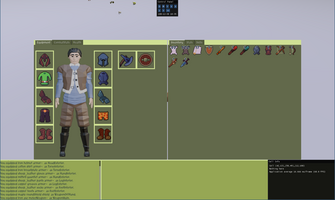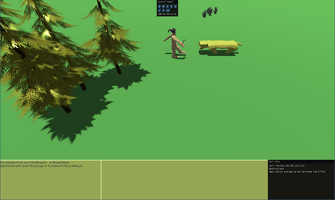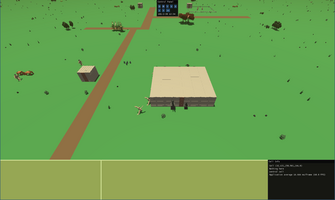Introducing Armonium



Armonium is a sandbox RPG that I’ve been actively working on since January 2024. In this first write-up, I’ll explain what drove me to create it and how it’s different from other RPGs.
I’ve been a huge fan of CRPGs all my life. I love Fallout, Arcanum, Planescape: Torment, and Baldur’s Gate. My biggest issue with these games is that the world doesn’t react to the player’s actions as it should. For instance, if the player takes a substantial action, such as killing the leader of a settlement or wiping out its population, the world’s economy doesn’t change unless the developers anticipated that action. Sometimes, all you get is a slightly different ending slide or a few new lines of dialogue. Usually though, you see no change in the world.
Another problem is that because these games have a predefined storyline, they essentially end at a certain point. While you can continue playing some of them after finishing the main story, there’s still a limit to what you can do. No new quests are generated, no new events occur beyond what the developers designed, and nothing in the world really changes anymore.
These issues exist because these games don’t simulate a living world; the developers have to code specific events or world changes based on the actions they expect players to take. Armonium is designed specifically to address this problem.
When the player starts Armonium, a new world is generated based on the parameters they select. The game begins by generating a map, followed by creating a few civilizations for each defined race. Each civilization starts with a settler party, and the simulation begins. The settler parties initially scout the area, find suitable locations to settle, and establish settlements. Depending on soil fertility and nearby resources, the settlements then farm, mine ores, hunt wild game, chop trees, and allow their population to grow. They also form more settler parties to establish new settlements in nearby locations until they populate the world. However, the settlements aren’t identical; larger cities are more likely to have high-tier work buildings like blacksmiths and leatherworkers that utilize the raw ores and leather provided by nearby villages.
The civilizations negotiate, wage wars, and trade based on their characteristics and values. Settlements construct buildings according to their racial and civilization-wide values, as well as their current needs. The player will witness the procedurally generated world events unfold before them and can choose to join in whenever they want. Since none of the events are hard-coded, the simulation will respond appropriately to the player’s actions. For example, if the player kills skilled miners in an iron mining outpost, the new, inexperienced miners will work significantly slower, hindering the civilization’s armor and weapon production. This, in turn, will weaken the civilization in future wars.
Armonium doesn’t expect or require the player to perform any specific action; it simply understands the causes and effects within its world. If the player alters the circumstances, the results will change accordingly. This systemic simulation allows players to express themselves, play any role they choose, and see the simulation react to their decisions.
This is the core idea behind Armonium: by creating a detailed and systemic simulation, individual actions and reactions don’t need to be hard-coded, and the world will respond appropriately to the player’s imagination, making Armonium truly a sandbox game. In another post, I’ll explain the technology that powers the game and how I’m making it as extendable as possible without making assumptions in the simulation code. You can follow my X account (link) for short updates or my itch.io page for longer devlogs.
Armonium
A sandbox RPG set in a procedurally generated fantasy universe
| Status | In development |
| Author | holgac |
| Genre | Role Playing, Simulation |
| Tags | Procedural Generation |
More posts
- Armonium November Report (v0.5.6)Dec 11, 2024
- Armonium October Report (0.4.6)Nov 04, 2024
- Armonium September Report (v0.3.4)Sep 26, 2024
Leave a comment
Log in with itch.io to leave a comment.